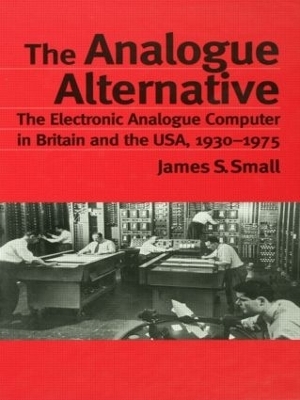
The Analogue Alternative
Routledge (Verlag)
978-0-415-86299-8 (ISBN)
From the late 1940s until the 1970s, analogue technology was a genuine alternative to digital, and the two competing technologies ran parallel with each other. During this period, a community of engineers, scientists, academics and businessmen continued to develop and promote the analogue computer. At the height of the Cold War, this community and its technology met with considerable success in meeting the urgent demand for high speed computing for use in the design and simulation of rockets, aircraft and manned space vehicles.
The Analogue Alternative tracks the development, commercialisation and ultimate decline of the electronic analogue computer in the USA and Britain. It examines the roles played by technical, economic and cultural factors in the competition between the alternative technologies, but more importantly, James Small demonstrates that non-technical factors, such as the role of "military enterprise" and the working practices of analogue engineers, have been the most crucial in analogue's demise. This book will be of interest to students of the history and sociology of science and technology, particularly computing. It will also be relevant to those interested in technical change and innovation, and the study of scientific cultures.
James S. Small has worked as a researhcer and lecturer at the University of Manchester in England and at the University of Maastricht in the Netherlands.
Introduction 1. Analogue Computing Devices in the 19th and Early 20th Centuries2. The Origins, Form and Function of Electronic Analogue Devices and Computers, 1937-19503. Electronic Analogue Computer Development, 1945-1955: Military Programmes, Aeronautics and Electronics4. Commercialisation, Hybridisation and Competition: the Electronic and Hybrid Computer Industry in the USA, 1945-19755. The Origins, Commericialisation and Decline of Electronic Analogue and Hybrid Computing in Britain, 1945-19756. Electronic Analogue Computers and Engineering Culture7. Negotiating a Place for Electronic Analogue Computers: the Analogue Versus Digital DebateConclusion
| Erscheint lt. Verlag | 25.10.2013 |
|---|---|
| Reihe/Serie | Routledge Studies in the History of Science, Technology and Medicine |
| Verlagsort | London |
| Sprache | englisch |
| Maße | 156 x 234 mm |
| Gewicht | 453 g |
| Themenwelt | Kunst / Musik / Theater ► Musik |
| Geisteswissenschaften ► Geschichte | |
| Mathematik / Informatik ► Informatik ► Theorie / Studium | |
| Naturwissenschaften ► Geowissenschaften ► Geografie / Kartografie | |
| ISBN-10 | 0-415-86299-X / 041586299X |
| ISBN-13 | 978-0-415-86299-8 / 9780415862998 |
| Zustand | Neuware |
| Informationen gemäß Produktsicherheitsverordnung (GPSR) | |
| Haben Sie eine Frage zum Produkt? |
aus dem Bereich


